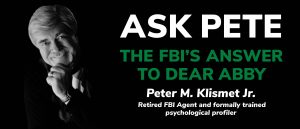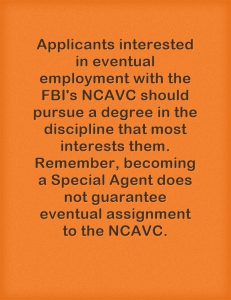
Pete Klismet has been helping writers (including me) for years. When I jokingly referred to him as the FBI’s Answer to Dear Abby, he didn’t object (too strenuously). What’s more, he offered to do a column for my blog periodically. Welcome to the first edition of Ask Pete. ~ Donnell
By: Peter M. Klismet, Jr.
Thanks to the CBS drama “Criminal Minds,” a question I get asked on a regular basis is how do I become a profiler?
With this in mind, the aim of this page is to explore whether becoming a profiler is a realistic career aspiration and the most obvious place to start is with information the FBI web page fbi.gov provides on the topic. Namely:
You first need to realize the FBI does not have a job called FBI Profiler. The tasks commonly associated with an FBI profiler are performed by Supervisory Special Agents assigned to the National Center for the Analysis of Violent Crime (NCAVC) at Quantico, Virginia.
These FBI Special Agents don’t get vibes or experience psychic flashes while walking around fresh crime scenes. It is a challenging world of investigation and research—a world of inductive and deductive reasoning; crime-solving experience; and knowledge of criminal behavior, facts, and statistical probabilities.
In addition to constructing “profiles” (descriptions of the traits and characteristics of unknown offenders in specific cases), the NCAVC staff provides many services to law enforcement agencies around the world. These services include major case management advice; threat assessment; and strategies for investigation, interviewing, or prosecution.
What Is An average Day Like for A NCAVC Special Agent?
One of the attractions of the position is that there is no such thing as an “average” day. Considerable time might be spent in a normal office setting, analyzing complex cases sent by law enforcement agencies for about 10 hours per day. The Special Agents might review crime scene photos and case materials to prepare an analysis for the requesting agency. There are instances where investigators or prosecutors will meet with a group of Special Agents to discuss their cases.
On any given day, emergency calls from FBI offices, local police, prosecutors, etc., interrupt a Special Agent’s plans. When an emergency call comes in, a group of Special Agents familiar with the type of case involved might gather for a telephone conference with the requesting agency. Unlike what is depicted on Criminal Minds, an entire team of six or eight agents doesn’t race to a Lear Jet – to be ‘wheels up’ in 30 minutes.
First of all, there is no Lear Jet parked outside the FBI Academy. Nor is there a Lear Jet at all. Secondly, an entire team is not sent to help an agency with a case. Most likely, one or two agents would be assigned.
Special Agents and support staff also share results of research and general information about the unit and services through presentations to such audiences as professional conferences or law enforcement training programs. Staff members publish articles in professional journals regarding research and practices of the NCAVC.
What Basic Requirements Do I Need to Join The NCAVC?
You do not complete New Agent training (at Quantico, Virginia), and  instantly get assigned to the NCAVC. One of the basic requirements is that you must have served as an FBI Special Agent for 3 years, but because the positions are so competitive, individuals selected usually possess 8 to 10 years of experience as a Special Agent.
instantly get assigned to the NCAVC. One of the basic requirements is that you must have served as an FBI Special Agent for 3 years, but because the positions are so competitive, individuals selected usually possess 8 to 10 years of experience as a Special Agent.
The NCAVC employs Special Agents with a variety of backgrounds; however, the most important qualifications include overall experience as an investigator specializing in violent crimes, particularly homicides, rapes, child abductions, and threats.
What Type of Degree Is Preferred for NCAVC Special Agent Positions?
The jobs within the NCAVC typically require experience and demonstrated abilities as a Special Agent rather than specific degree majors.
There are usually no set degree criteria, although job advertisements typically list an advanced degree in a Behavioral or Forensic Science as a “preferred qualification.”
Applicants interested in eventual employment with the FBI’s NCAVC should pursue a degree in the discipline that most interests them. Remember, becoming a Special Agent does not guarantee eventual assignment to the NCAVC.
Finally – what is involved in becoming a Special Agent ….?
Competitive candidates will be required to complete a battery of written tests and, in some cases, specialized testing in their field of expertise. If you pass these tests, you may be eligible for an interview based upon your overall qualifications, your competitiveness with other candidates, and the needs of the FBI.
Successful completion of the written test and an interview will be followed by a thorough background investigation that includes: credit and arrest checks; interviews of associates; contacts with personal and business references, past employers and neighbors; and verification of educational achievements.
 Certain factors will disqualify a candidate from selection as a Special Agent. These factors include: conviction of a felony or major misdemeanor; use of illegal drugs; or failure to pass a drug-screening test. All candidates will be given a polygraph examination to determine the veracity of information provided in their application for employment, to include the extent of any illegal drug usage and issues surrounding security concerns.
Certain factors will disqualify a candidate from selection as a Special Agent. These factors include: conviction of a felony or major misdemeanor; use of illegal drugs; or failure to pass a drug-screening test. All candidates will be given a polygraph examination to determine the veracity of information provided in their application for employment, to include the extent of any illegal drug usage and issues surrounding security concerns.
A medical examination must be passed to determine physical suitability for the Special Agent position. You are expected to be physically fit to participate in the demanding physical training conducted at the FBI Academy, and upon graduation, to execute the duties of a law enforcement officer. All candidates must meet a standardized weight to height ratio and/or body fat requirement to be qualified for appointment.
About the Author: Peter M. Klismet, Jr. holds a master’s degree in criminal justice from California Lutheran University and another in public administration from the University of Southern California. He is a former agent with the Federal Bureau of Investigation, and was one of the first formally trained psychological profilers within the Bureau. He served in law enforcement for over thirty years before joining the faculty at Pikes Peak Community College as an associate professor of criminal justice, going on to chair the department. He is now the founder and director of Criminal Profiling Associates, a law enforcement consulting company.











Pete, I found a writer’s workshop on profiling (Criminal Investigative Analysis! See, I remember!) that you gave not too long ago INVALUABLE to a book I recently finished writing. Perfect timing. I still need to buy your book on that very subject. Can you please remind me of the title and where to get it?
Hi Lena ….. my latest book – which I probably alluded to in our workshops – is “Profiling Violent Crime: A Behavioral and Forensic Approach” (or something like that..!!) … It’s available on Amazon, but a much better deal is thru my publisher – Cognella.com …. a whole lot cheaper for the soft cover. The hardback (since it’s a college and university textbook) is priced waaaay too high – about 179.99. I didn’t pay anywhere near that much when I was in college or grad school..
Great and interesting info. I’m looking forward to your regular appearances.
Me too! C.F. 🙂
Interesting info. And appreciate you sharing.